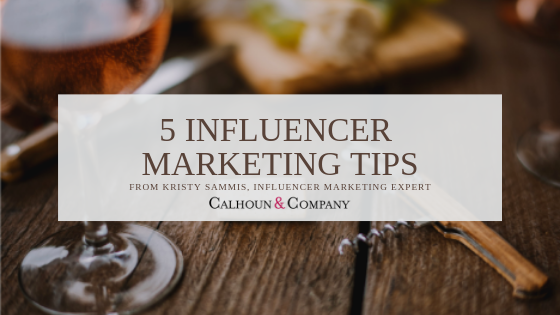5 Influencer Marketing Tips
Calhoun & Company recently attended a Wine Women marketing seminar on Influencer Marketing, which was presented by Kristy Sammis of Real Clever. She brought her nine years of experience and delivered a fantastic seminar that was followed by an interesting discussion. We walked away with some great ideas and helpful information.
Here are our top five takeaways:
1) Influencer Marketing = Millennial Marketing
If your brand or product is trying to reach Millennials, chances are you need to consider influencer marketing. Kristy defined an influencer as “anyone who can convince an audience to take action.” This definition then comes with various levels of influencers, such as everyday people in your life, to micro-influencers, to celebrities. Rates, accessibility, and audience size all vary depending on the “level" of influencer you’re engaging. What these levels all have in common is they all have a targeted, specific, captivated audience. The content they make is unique, relatable, and authentic for your marketing efforts.
2) Your goal is as important as your influencer!
You need to understand what you are looking for from the campaign. What are the gaps in your marketing plan? Do you want to promote brand awareness, increase sales, help with a launch? Each of these is a different goal and a different campaign. We can’t expect one influencer marketing campaign to do it all.
3) How are you measuring your campaign’s success?
One of the most common questions our clients ask us is “how do we measure the success of an influencer campaign?” Often, the answer is related to your brand’s specific and unique goals. Do you want to increase website traffic, sales, or brand exposure? Some of the best measurements come from website clicks, traffic and offering a discount code to the influencer’s audience. You can track website traffic through Bitly links and Google Analytics. We require our influencers to provide their Google Analytics a month after the post and again six months after the post to see the traffic and reach of the content.
4) Compensation is necessary
One should expect to compensate influencers. They don’t pay their rent with wine or exposure. Long-term contracts allow you to negotiate rates, as influencers are often open to taking a reduced rate for established work. We have seen prices from $100 to $1,000 for an Instagram post and anywhere from $500 to $5,000 for a blog post. It really depends on what the influencer is offering as exposure and their audience.
5) Contracts outline a clear and defined partnership.
When we engage with an influencer, we are engaging in a business relationship, not unlike any other contractor a brand might work with. A contract ensures clear communication: from the scope of work, duration, and payment processes to the compliance of all laws and regulations. In the alcohol and spirits industry, full knowledge of TTB, FTC, and ABC regulations is mandatory.
Influencer marketing is here to stay. As a brand looking to work with influencers, having the background in influencer relationship management and what it can do for your company is important. Agencies like Calhoun & Company can streamline this process for you with our preexisting influencer relationships.

